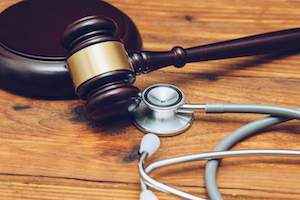June 2019 - When Routine Procedures Lead to Medical Errors
 According to a recent study, one in seven Medicare patients experienced medical errors while in the hospital. But medical errors can happen anywhere – hospitals, doctor’s offices, surgery centers, nursing homes, pharmacies, even the patient’s own home – and they occur more frequently than expected in connection with routine procedures.
According to a recent study, one in seven Medicare patients experienced medical errors while in the hospital. But medical errors can happen anywhere – hospitals, doctor’s offices, surgery centers, nursing homes, pharmacies, even the patient’s own home – and they occur more frequently than expected in connection with routine procedures.
Six routine procedures have been identified risk areas: biopsies, injections; medical imaging, punctures, tube insertions, and scopes. Things that can go wrong with some of these procedures include:
Biopsies- Cross contamination where non-cancerous cells are contaminated, resulting in false positive test results;
- Mislabeled specimens;
- Misinterpretation of biopsy results.
- Medications administered at the wrong time or not at all;
- Wrong doses being administered;
- Incorrect drugs being given;
- Medications administered through the incorrect route.
- Perceptual errors in which the image is misinterpreted;
- Cognitive errors leading to misunderstanding the importance of an abnormality.
- Confusing tubes that look similar, like chest tubes and feeding tubes, resulting in medicine or food intended for the stomach going into the chest;
- Incorrect placement and/or connection, such as placing a feeding tube into the lung instead of the stomach or connecting a tube to a ventilator port;
- Using universal connectors to connect tubes with dissimilar functions.
One possible explanation for such errors may be that the frequency with which these procedures are performed can affect the level of attention and care used. Another possible explanation is that many of these procedures are now performed in outpatient settings that have fewer resources and less supervision than larger hospitals. Whatever the reason, medical errors can result in serious, even life-threatening injuries.
Medical malpractice cases are complicated. Several requirements must be met for a claim to be considered valid: the accepted standard of care was violated; the injury resulted from negligence; and the patient suffered significant damages (permanent disability, severe pain and suffering, significant medical bills, loss of income).
The best defense: be your own medical advocate – ask questions and express your concerns. If you suspect you’re a victim of medical malpractice, seek counsel from an experienced medical malpractice attorney.
 New Jersey Medical Malpractice Lawyers Kearns Rotolo Law Home
New Jersey Medical Malpractice Lawyers Kearns Rotolo Law Home














